
In this special issue, we explore the feasibility of assessing paired speaking via video-call (VC) from multiple perspectives in the context of the Cambridge English Qualifications (CEQs) Speaking paper.
Download Issue 86
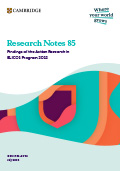
This issue presents six papers from the 2022 English Australia/Cambridge University Press & Assessment Action Research in ELICOS (English Language Intensive Courses for Overseas Students) Program.
Download Issue 85
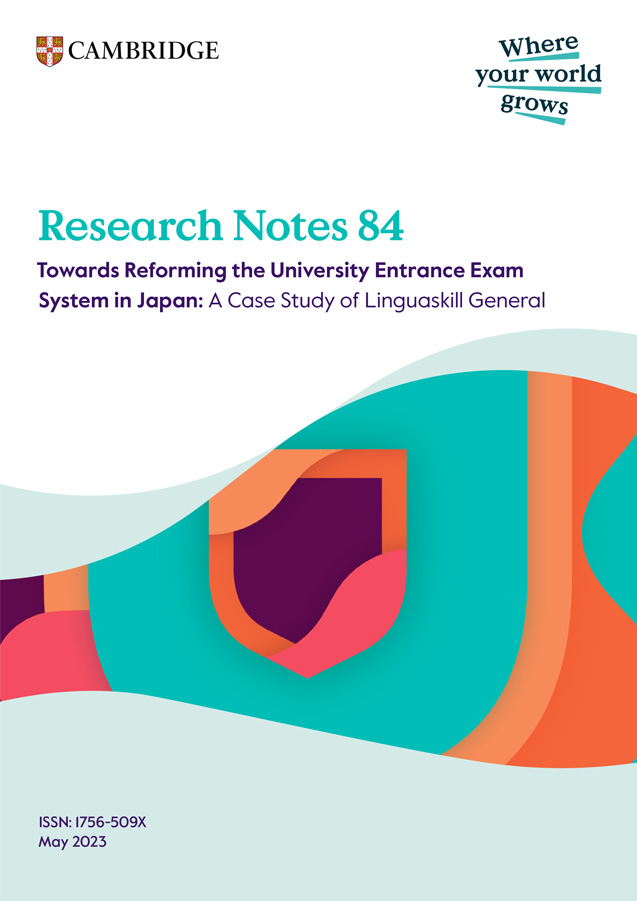
This issue contains a report from the Cambridge English Funded Research Programme (CEFRP). In response to the increasing demand for reforming the university admission examination system in Japan, this research investigated (a) to what extent and in what ways Linguaskill matches the curriculum of English education in Japan, and (b) what support test-takers and high school teachers wish to receive when preparing for taking Linguaskill General. Findings from the two phases of the project were integrated to offer a pathway to facilitate two-way communication between the exam board and high school teachers and students, and this research took the first step towards building a relevant communication model in the examination reform in Japan.
Download Issue 84
Full Issue
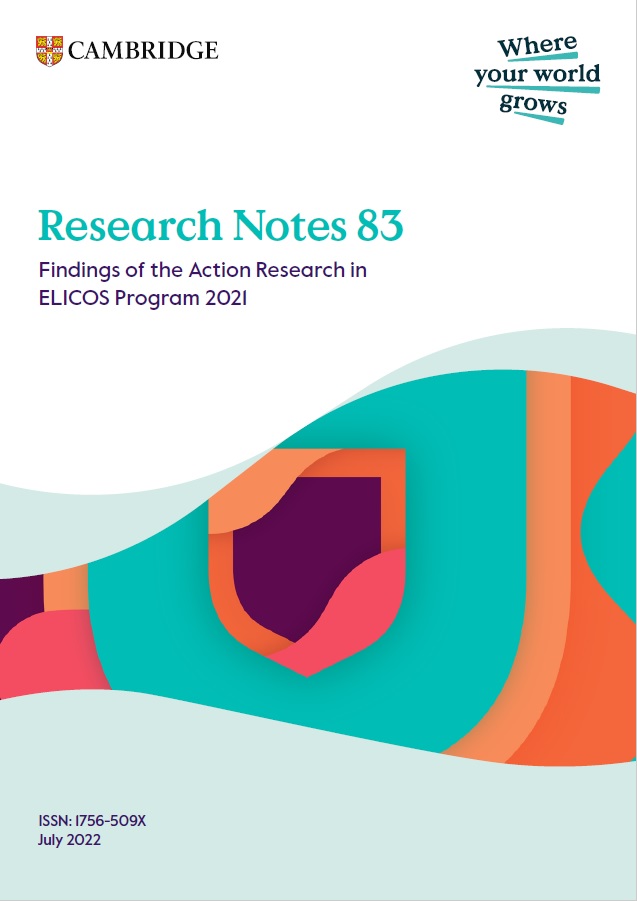
This issue presents six papers from the 2021 English Australia/Cambridge University Press & Assessment Action Research in ELICOS (English Language Intensive Courses for Overseas Students) Program.
Download Issue 83
Issue 83 by article
Editorial (Sian Morgan)
This issue presents six papers from the 2021 English Australia/Cambridge University Press & Assessment Action Research in ELICOS (English Language Intensive Courses for Overseas Students) Program.
Morgan, S. (2022) Editorial. Research Notes, 83, 4.
Download Editorial - Issue 83
Why collaboration matters in language teaching action research (Anne Burns)
A longstanding challenge for language teachers is finding time to interact with their colleagues on professional matters – such isolation risks teachers being unable to share and find solutions for challenges, and learn from peer expertise. Burns outlines not only why such teacher conversations are crucial but also how action research can create a collaborative professional learning process.
Burns, A. (2022). Why collaboration matters in language teaching action research. Research Notes, 83, 5–12.
Download Burns, A. - Issue 83
Implementing peer feedback for writing tasks (Vahida Berberovic)
Teacher feedback for language students is an accepted cornerstone of their learning, yet its impact is hard to measure and teachers often find their advice ignored. Berberovic argues that the most effective feedback may in fact be peer feedback as it falls within learners’ Zone of Proximal Development (ZPD) – the area of development where learners are ready for new stages of learning – and describes her experience of facilitating peer feedback for writing tasks in an academic context.
Berberovic, V. (2022). Implementing peer feedback for writing tasks. Research Notes, 83, 13–24.
Download Berberovic, V. - Issue 83
Using ipsative assessment in teaching and learning English grammar through e-portfolios (Snezhana Chernova and Mukesh Abbasi)
Faced with student boredom at learning grammar, action researchers Chernova and Abbasi decided to apply an ipsative approach to their upper-intermediate classes – that is, encouraging students to monitor their own academic progress and set personal long-term learning objectives. Through the use of e-portfolios, the authors attempted to shift the perception of grammar learning as repetitive and rule-based to a more outcome-focused process.
Chernova, S., & Abbasi, M. (2022). Using ipsative assessment in teaching and learning English grammar through e-portfolios. Research Notes, 83, 25–34.
Download Chernova, S., & Abbasi, M. - Issue 83
Formative speaking assessment: Beginning with story (Sue Watson)
Recent innovations in formative assessment have focused strongly on personalisation, and the freedom of self-expression offered by creative writing (CW) has found a role in English as Second Language (ESL) learning. After facilitating CW workshops for international students, Watson undertook action research into how CW could foster speaking development in formative assessment.
Watson, S. (2022). Formative speaking assessment: Beginning with story. Research Notes, 83, 35–46.
Download Watson, S. - Issue 83
Implementing an integrated skills test in a Direct Entry project (Rose Harvey)
Discrete item testing has been a mainstay of language assessment for many years, but the move towards assessment that simulates real-life contexts of use encouraged Harvey and her colleagues to consider integrated skills testing as an alternative. Integrated assessments are well supported by academic literature, but this action researcher outlines challenges in design, scoring and stakeholder resistance.
Harvey, R. (2022). Implementing an integrated skills test in a Direct Entry project. Research Notes, 83, 47–56.
Download Harvey, R. - Issue 83
Towards a peer feedback scaffold (Paola Clews)
Although peer feedback is frequently endorsed and employed by language teachers, Clews wanted to address the absence of recommended practical means of supporting such feedback. The action researchers details the creation of a model that not only scaffolds the process of peer feedback, but endeavours to encourage students’ understanding and appreciation of this type of peer interaction.
Clews, P. (2022). Towards a peer feedback scaffold. Research Notes, 83, 57–66.
Download Clews, P. - Issue 83
The upward cycle: Learner progress through critical reflection and strategic response (Dale Jung and Kate Randazzo)
While running a foundation course for students entering undergraduate language learning degrees, it became clear to Jung and Randazzo that monitoring learner progress was crucial both to their skill development and refinement of their learning habits – the latter being particularly important to adapting to undergraduate learning and the move to online versions of the course. The use of blogging and learning management systems for the purposes of monitoring progress are outlined in this article.
Jung, D., & Randazzo, K. (2022). The upward cycle: Learner progress through critical reflection and strategic response. Research Notes, 83, 67–84.
Download Jung, D., & Randazzo, K. - Issue 83
Full Issue
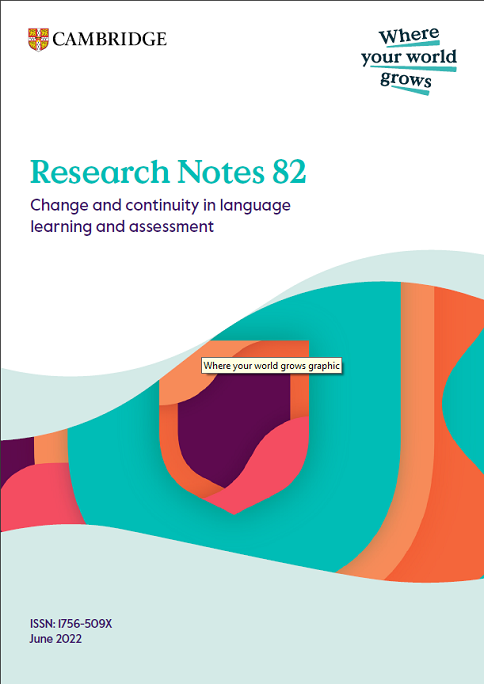
This issue of Research Notes features two reports illustrating the importance of both change and continuity in successful language teaching and learning.
Download Issue 82
Issue 82 by article
Editorial (Sian Morgan)
Many of our colleagues at Cambridge University Press & Assessment come from teaching backgrounds. Often, they continue their professional development by undertaking a postgraduate degree to focus on their particular area of interest. In this issue of Research Notes, two reports from Sarah Albrecht and Colin Williams illustrate the importance of both change and continuity in successful language teaching and learning.
Morgan, S. (2022). Editorial. Research Notes, 82, 4.
Download Editorial - Issue 82
What do teachers do in the age of Zoom? The Covid-19 crisis and the role of the language teacher (Sarah Albrecht)
The Covid-19 crisis generated an unprecedented challenge for educational systems across the globe, obliging many teachers to rapidly shift from traditional classrooms to the online environment. This article describes a qualitative research project based on the resulting hypothesis that teacher roles were significantly displaced, which identified the co-dependence of teacher and technology and identified the need for both systematic Continuous Professional Development (CPD) and a global levelling up of digital services.
Albrecht, S. (2022). What do teachers do in the age of Zoom? The Covid-19 crisis and the role of the language teacher. Research Notes, 82, 5–21.
Download Albrecht, S. - Issue 82
From slifor to Slytherin: The relationship between word form and meaning (Colin Williams)
This study examines whether English consonant clusters carry intrinsic meaning in submorphemic units known as phonesthemes – defined by the Oxford English Dictionary as ‘a phoneme or group of phonemes having recognisable semantic associations, as a result of appearing in a number of words of similar meaning’. Using the British National Corpus (BNC), the author analyses how frequently particular onset clusters can be mapped to words from the same semantic field in Present Day English (PDE), and investigates if native speakers can identify phonesthemes in obsolete Old English and Middle English words to deduce meaning.
Williams, C. (2022). From slifor to Slytherin: The relationship between word form and meaning. Research Notes, 82, 23–51.
Download Williams, C. - Issue 82
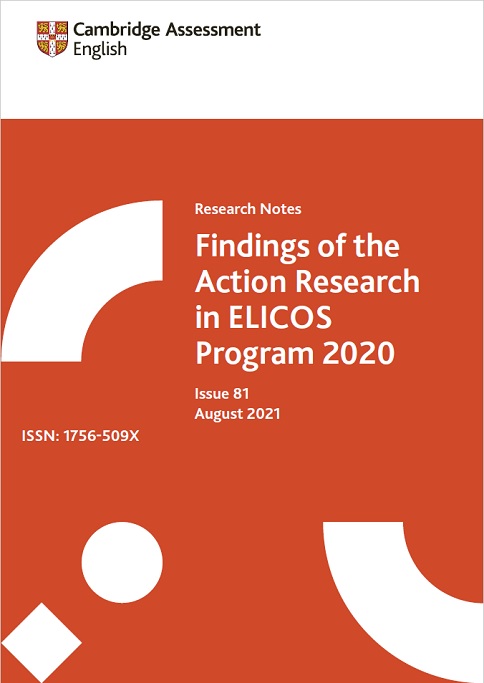
This issue presents six papers from the 2020 English Australia/Cambridge English Action Research in ELICOS (English Language Intensive Courses for Overseas Students) Program.
Download Issue 81
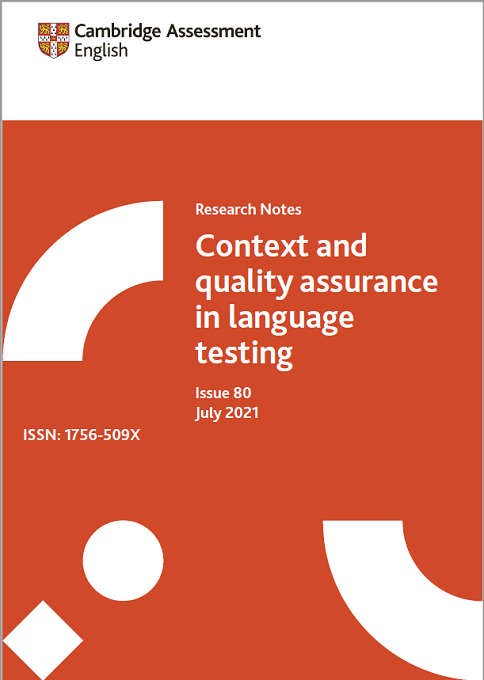
This issue reflects on quality assurance in three different contexts of language testing.
Download Issue 80
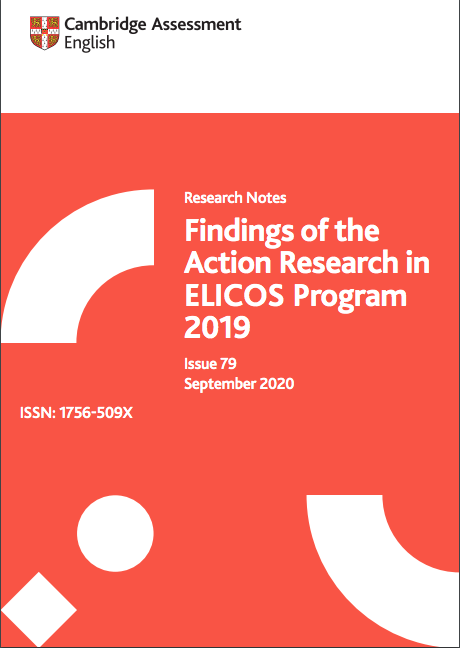
This issue presents six papers from the 2019 English Australia/Cambridge English Action Research in ELICOS (English Language Intensive Courses for Overseas Students) Program.
Download Issue 79
Issue 78 - What does plurilingualism mean for language assessment?
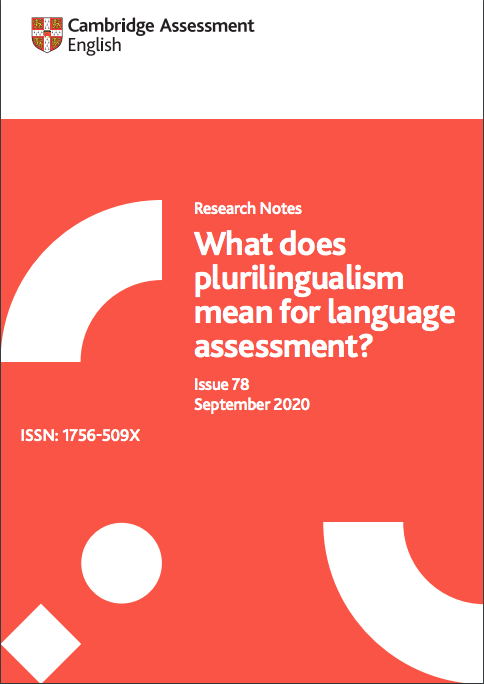
This issue defines and discusses plurilingualism, reflecting on approaches to the concept by Cambridge English and three case studies from institutions involved in the Association of Language Testers in Europe (ALTE).
Download Issue 78
 .jpg)
This edition of Research Notes features three studies with individual teachers working in the field of higher education, and provides diverse examples of learning and assessment tailored to individual contexts.
Download Issue 77
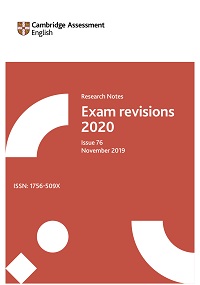
The investigations and rationale behind the revision of A2 Key and B1 Preliminary are documented in this issue, with articles covering stakeholder consultation and improvements made to the four components of both qualifications.
Download Issue 76
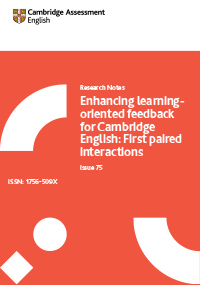
This issue consists of a report from the Cambridge English Funded Research Programme (CEFRP), on developing a resource bank of worked examples for the paired collaborative task in the B2 First Speaking exam.
Download Issue 75
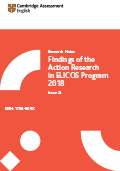
This issue presents six papers from the 2018 English Australia/Cambridge English Action Research in ELICOS (English Language Intensive Courses for Overseas Students) Program.
Download Issue 74
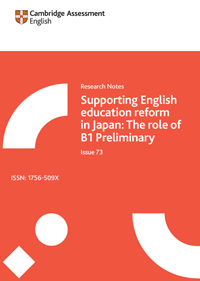
This issue presents a report from the Cambridge English Funded Research Programme on the possible use of B1 Preliminary for university entrance in Japan.
Download Issue 73
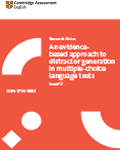
This issue contains a report from a research project that explored the feasibility of a new approach to evidence-based distractor set generation. The project was carried out in the Assessment group at Cambridge English.
Download Issue 72
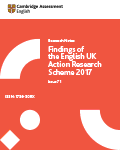
This issue presents a sample of the findings of the Cambridge English/English UK Action Research Scheme.
Download Issue 71
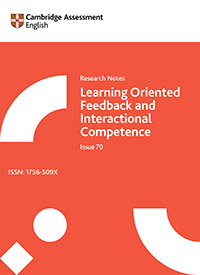
This issue contains a report on interactional competence (IC) at B2 level from the Cambridge English Funded Research Programme.
Download Issue 70

This issue presents six papers from the 2017 English Australia/Cambridge English Action Research in ELICOS (English Language Intensive Courses for Overseas Students) Program.
Download Issue 69

This issue presents five papers from the 2016 Cambridge English/English UK Action Research Scheme.
Download Issue 68

This issue presents the research undertaken within the 2016 English Australia/Cambridge English Action Research in ELICOS Program.
Download Issue 67

This issue presents five papers from the 2015 Cambridge English/English UK Action Research Scheme.
Download Issue 66

In this issue of Research Notes we share six educational reform projects that Cambridge English has undertaken in collaboration with ministries of education and other institutions in a variety of international contexts.
Download Issue 65

This issue presents the research undertaken within the 2015 English Australia/Cambridge English Action Research in ELICOS Program, with a particular focus on creativity.
Download Issue 64

The focus in this issue is collaboration with European projects, such as the European Commission’s 2015 'Study on comparability of language testing in Europe' and the recent updating of the CEFR's illustrative descriptors.
Download Issue 63

Over seven articles, this issue covers the stages of the 2011–2015 revisions to the Cambridge English: First and Cambridge English: Advanced examinations, from consultation with stakeholders to the refinement of each individual exam component.
Download Issue 62 (PDF 2MB)

This issue presents the six funded research papers undertaken within the 2014 Cambridge English/English UK Action Research Scheme, which supports teachers working in courses of English as a foreign language at the centres accredited by the national association English UK.
Download Issue 61 (PDF 2MB)

This issue presents the research undertaken within the 2014 English Australia/Cambridge English Action Research in ELICOS Program.
Download Issue 60 (PDF 2MB)

This issue sheds light on a life cycle of Cambridge English language tests, focusing on analyses and processes which ensure a delivery of accurate and meaningful results.
Download Issue 59 (PDF 2MB)

Issue 58 includes seven papers on the impact of Cambridge English exams and English language learning programmes in a variety of contexts.
Download Issue 58 (PDF 2MB)

This issue includes four studies undertaken for the fourth round of the Cambridge English Funded Research Programme, one undertaken in round three and a further research project. The research topics are: Teachers’ views on the impact of Cambridge English: Young Learners exams in Spain and Cambridge English: First in Cyprus; the impact of the Teaching Knowledge Test on Chinese teachers’ knowledge and practice; the impact of Cambridge English exams on institutional change in Argentina; and two studies focusing on identifying features of candidates’ speaking at different proficiency levels and how Speaking Examiners perceive their own assessments of Cambridge English: Advanced candidates.
Download Issue 57 (PDF 1MB)

This issue presents six research projects funded by the 2013 English Australia/Cambridge English Action Research Program for teachers working in the ELICOS (English Language Intensive Courses for Overseas Students) sector in Australia. The research topics include: helping students prepare for the Cambridge English Knowledge About Language module of TKT; preparing students for an academic presentation; using feedback to improve speaking skills and develop autonomous learning strategies; and using online tools to improve learners’ speaking skills.
Download Issue 56 (PDF 1.55MB)

In September 2010, Cambridge English and the University of Michigan English Language Institute Testing and Certification Division formed Cambridge Michigan Language Assessments (CaMLA). The articles in this issue give the reader a better understanding of CaMLA’s suite of tests as well as the processes and concerns that are specific to their context of use. Articles focus on: fairness principles and procedures; frameworks designed to facilitate item writing; and exam revision and validation studies.
Download Issue 55 (PDF 1.37MB)
Please note: Cambridge Michigan Language Assessments has since changed its name to Michigan Assessment English.

This issue focuses on three case studies produced for the third round of the Cambridge English Funded Research Programme. Topics covered include: core beliefs underpinning Delta trainers’ pedagogical practices; Cambridge English: Key for Schools’ effect on teaching practices in Brazil, and young Japanese learners’ perceptions of Cambridge English: Starters. Two final articles examine the language skills of healthcare workers in relation to the Occupational English Test (OET), and the forthcoming book: Validity in Educational and Psychological Assessment.
Download Issue 54 (PDF 907kb)

This issue presents research undertaken within the 2012 English Australia/Cambridge English Action Research programme, which supports teachers working in the ELICOS sector in Australia. Five funded projects are presented by the teacher-researchers who participated in the 2012 Programme. Subjects covered include: ways of improving learners’ speaking skills and improving learner autonomy. This issue concludes with a report on the gala event for the Action Research in ELICOS programme, and a report on ALTE activities.
Download Issue 53 (PDF 3.1mb)

This issue focuses on the first European Survey on Language Competences (ESLC), with contributions from ESLC Director Dr Neil Jones, the project team and ESLC national coordinators, describing the development and implementation of the survey and the implications for its results. Also featured is work completed for the Cambridge English Funded Research Programme (Round 2), including the use of coh-metrix for analysing Reading texts and the criterial features of Speaking at different CEFR levels.
Download Issue 52 (PDF 2.2mb)

This issue celebrates both 100 years of Cambridge English examinations and the launch of the updated Cambridge English: Proficiency exam. Topics include: a historical account of the development of Cambridge English and how its approach to test validation has been refined; a detailed description of the updated exam; stakeholder perceptions and candidature of the exam; and the processes and rationale behind revising it. Chief Executive Dr Michael Milanovic also speculates about the role Cambridge English may play in the next 100 years.
Download Issue 51 (PDF 3.9mb)

This special 50th issue of Research Notes, guest edited by Dr Jayanti Banerjee, focuses on impact. The Cambridge English approach to impact is introduced by Dr Nick Saville and is illustrated through six studies. Subjects include: the impact of Cambridge English exams as part of larger educational reform initiatives in Vietnam and China; exploring their potential effects in French and Spanish school associations; and stakeholder perceptions of the exams in China.
Download Issue 50 (PDF 1.8mb)

This issue examines performance testing, mostly focusing on written assessment. Articles include: revising the Cambridge English: Proficiency (CPE) Writing paper; the development of mark schemes; comparing computer-based and paper-based Writing for Cambridge English: Preliminary (PET); authenticity of task design in tests of academic writing and implementing a socio-cognitive model of reading in the UAE context.
Download Issue 49 (PDF 1.3mb)

This issue presents research undertaken as part of the 2011 English Australia/Cambridge ESOL Action Research in ELICOS Programme, which supports teachers working in the English Language Intensive Courses for Overseas Students (ELICOS) sector in Australia. Included are six funded research projects completed by teacher-researchers from five different institutions and several regions within Australia.
Download Issue 48 (PDF 1.8mb)

Under the guest editorship of Dr Jayanti Banerjee, this issue presents the outcomes from the first round of the Cambridge English Funded Research Programme undertaken in 2010. It presents four articles outlining investigations into the validity of test items and candidates’ output, and the impact and use of Cambridge English tests in two specific contexts. It also includes an update on the 40th ALTE conference.
Download Issue 47 (PDF 3.9mb)

This issue focuses on issues in teaching and assessing young learners and includes articles on:
- Cambridge English: Young Learners (YLE) tests and teaching in the Taiwanese context
- seeking stakeholders’ views on Cambridge English exams
- benchmarking young learners in Spain
- vocabulary acquisition in children
- textbook recordings
- teaching a course in assessment literacy to test takers.
Download Issue 46 (PDF 2.7mb)

This issue includes some of the papers presented at the Language Testing Research Colloquium (LTRC) in London in 2010, which was hosted by Cambridge English. The conference theme was Crossing the threshold: investigating levels, domains and frameworks in language assessment.
Download Issue 45 (PDF 452kb)

In this issue, we report on collaboration between English Australia (EA) and Cambridge English in the form of supporting action research and promoting the professional development of teachers who teach English Language Intensive Courses for Overseas Students (ELICOS) in Australia.
Download Issue 44 (PDF 515kb)

This issue of Research Notes is dedicated to the latest developments in technology harnessed for the purposes of language assessment at Cambridge English.
The very first Research Notes issue, published in 2000, contained an article on the use of computers in the Local Item Banking System at Cambridge English. The theme of the use of technology was continued in issues 12 (2003) and 23 (2006), which addressed the relationship between technology and language assessment within Cambridge English examinations.
Download Issue 43 (PDF 538kb)

This special issue of Research Notes features summaries of doctoral and Master’s theses by Cambridge English staff. Topics covered include: developing a model for investigating the impact of language assessment; construct validation of the Reading module of an EAP proficiency test battery; comparing proficiency levels in a multi-lingual assessment context; testing financial English – specificity and appropriacy of purpose in Cambridge English: Financial (ICFE); the expression of affect in spoken English; peer–peer interaction in a paired Speaking test – the case of Cambridge English: First (FCE); second language acquisition of dynamic spatial relations; demonstrating cognitive validity of IELTS academic Writing task; qualification and certainty in L2 writing – a learner corpus study; prompt and rater effects in second language writing performance assessment; computer-based and paper-based writing assessment – a comparative text analysis; a study of the context and cognitive validity of a Cambridge English: Business Vantage (BEC Vantage) test of Writing; models of supervision – some considerations; a framework for analysing and comparing CEFR-linked certification exams; IRT model fit from different perspectives.
Download Issue 42 (PDF 377kb)

This issue focuses on the linguistic features of a variety of Cambridge English examinations and how they differ from one proficiency level to another. Topics covered include: insights and issues arising from the English Profile Wordlists project; use of words and multi-word units in Skills for Life Writing examinations; lexis in the assessment of Speaking and Writing – an illustration from Cambridge English’s General English tests; a mixed-method approach towards investigating lexical progression in Main Suite Reading test papers; a corpus-led exploration of lexical verb use in Main Suite Writing papers; TKT: Knowledge About Language and the assessment of lexis, phonology, grammar and discourse.
Download Issue 41 (PDF 363kb)

This issue focuses on governmental projects that go across the educational spectrum from primary level to higher education. Subjects covered include: Cambridge English’s growing impact on English language teaching and learning in national education projects; General English examinations – the case of Germany; the adoption of international certification in the French state school sector; Cambridge English and Spanish school networks; the use of Cambridge English: Business Certificates as a measurement instrument in higher education in China; Cambridge English trains Thai teachers; Colombia national bilingual project; working together – the case of the English Diagnostic Test and the Chilean Ministry of Education.
Download Issue 40 (PDF 270kb)

The theme of this issue is quality assurance and its impact on language assessment, language and teaching. Subjects include: setting the standard – quality management for language test providers; implementing an internal audit process – a case study from Cambridge English; using conversation analysis to investigate the interaction of QMS audits; working with examination centres to encourage continuous high standards; the centre inspections programme; auditing the quality profile – from code of practice to standards; training auditors: the ALTE system; auditing Cambridge English’s Main Suite and Cambridge English: Business Certificates examinations; international accreditation of quality in language learning and teaching.
Download Issue 39 (PDF 718kb)

This issue focuses on professional development, both within Cambridge English and more widely. This topic includes the services we offer to encourage and support the professional development of educators and other stakeholders working with those taking a Cambridge English examination or teaching award.
Download Issue 38 (PDF 544kb)

The topic of this issue is the Common European Framework of Reference for Languages (CEFR) and its impact on language assessment, specifically how it is used in Cambridge English. This issue opens with an introduction by Cambridge English Chief Executive, Dr Michael Milanovic, who has been involved with the CEFR since its inception and who outlines his own stance on the CEFR and describes its influence on his own work and that of Cambridge English. This is followed by a series of articles by Cambridge English staff describing in more detail the practical, theoretical and wider issues that we face on a daily basis in relation to the CEFR.
Download Issue 37 (PDF 381kb)

This issue focuses on assessment for learning or formative assessment, usefully defined in this issue as ‘any activity (not limited to testing) which engages the expertise of language assessment specialists and has the aim of supporting learning’. Topics covered include: the classroom and the Common European Framework: towards a model for formative assessment; development of Can Do statements for Cambridge English: Key for Schools (KET for Schools) and Cambridge English: Preliminary for Schools (PET for Schools); adapting testing materials for younger learners: developing Cambridge English: Key for Schools and Cambridge English: Preliminary for Schools; validating a worldwide placement test for German; linking learning and assessment: Cambridge English’s blended learning approach; impact of a blended learning course – observation and stakeholder views.
Download Issue 36 (PDF 543kb)

The second of two issues that continue the theme of the ALTE 2008 conference, hosted by Cambridge Assessment. This event focused on the social and educational impact of language assessment and involved hundreds of delegates from many countries. In this issue we include contributions from Cambridge English colleagues and external contributors, all of whom describe various aspects of the social impact of language assessment in a range of contexts.
Download Issue 35 (PDF 293kb)

This is the first of two issues that continue the theme of the ALTE 2008 conference, hosted by Cambridge Assessment. This event focused on the social and educational impact of language assessment and involved hundreds of delegates from many countries. In this issue we include contributions from Cambridge English colleagues and external contributors, all of whom describe various aspects of the educational impact of language assessment in a range of contexts.
Download Issue 34 (PDF 322kb)

This issue focuses on English Profile, a collaborative programme of research, consultation and publication, designed to enhance the learning, teaching and assessment of English worldwide. We describe how English Profile came about, its academic and institutional partners and its three research strands, with contributions from project partners and researchers from the growing number of English Profile networks.
Download Issue 33 (PDF 327kb)

In this issue we focus on the skill of listening, the receptive skill which features in all of our language assessments. We discuss issues relevant to testing listening comprehension including establishing the nature of listening ability in a second language; the impact of technology, including the computer-based testing of listening; the writing of listening test items, including establishing sources of item difficulty; the nature of vocabulary in Listening tasks across English for specific purposes and General English tests.
Download Issue 32 (PDF 381kb)

In this issue we focus on the skill of reading, a component in all of our language assessments and teaching awards. We approach reading in a number of ways: from the general to the specific: from the theoretical (defining the construct); through the practical (operationalising the construct) to corpus-informed studies of reading vocabulary across the proficiency continuum and finally to the thematic organisation of reading passages.
Download Issue 31 (PDF 309kb)

In this issue we focus on the processes and outcomes involved in reviewing our exams, with specific reference to the reviews of Cambridge English: First (FCE) and Cambridge English: Advanced (CAE) which culminated in December 2008 with the first administration of the updated exams. This issue provides an overview of the Cambridge English: First and Cambridge English: Advanced Review Project and presents a range of major research and consultation activities – together with their outcomes – undertaken both within this project and for other exams.
Download Issue 30 (PDF 398kb)

In this issue we focus on the growing range of Cambridge English qualifications and awards designed to support initial training and ongoing professional development for teachers of English worldwide. Subjects include: Cambridge English teacher training and development – future directions; the Delta Revision Project – progress update; Delta reliability – estimating and reporting examiner performance indices for the written examination component; what difference does Delta make?; setting international standards for teaching communities of practice and teacher education – the contribution of the CELTA trainer training programme; ICELT and PEP Ukraine – evaluation of a reflective ESP teacher development programme; TKT (Teaching Knowledge Test) update.
Download Issue 29 (PDF 309kb)

In this issue we focus on the theme of testing young learners. Juliet Wilson’s introductory article outlines the background to the 2007 review of Cambridge English: Young Learners (YLE); she goes on to consider the modifications and trialling of three different tasks and describes the research which was carried out to update the vocabulary lists.
Download Issue 28 (PDF 300kb)

In this issue we focus on the theme of testing English for business and other work-related contexts. In his opening article, David Thighe discusses the response by Cambridge English to the changing assessment requirements that are resulting from globalisation and migration. Key issues include the notion of specificity, the nature of authenticity and the role of content knowledge.
Download Issue 27 (PDF 258kb)

The theme of this issue is corpora and language assessment, which is an increasingly important aspect of language testing and related areas such as teaching and publishing, as well as being more widely used in diverse fields within linguistics and education. In this issue we provide an overview of the use of corpora in testing to date and describe our current involvement in the development of corpus resources, while also considering how these and other technological developments, such as Electronic Script Management (ESM), inform our understanding of the constructs underlying language tests.
Download Issue 26 (PDF 282kb)

The theme of this issue is testing Language for Specific Purposes (LSP), an area of growing relevance in a world where specific domains demand their own language assessments in addition to well-established General English provision. Linked to an increase in the number of domains requiring specific provision (business, legal, medical, etc.) is the growth in tailor-made products for specific markets. Language testers need to be able to respond to such requirements to ensure that quality and reliability of language tests are maintained in line with existing products and frameworks.
Download Issue 25 (PDF 125kb)

The theme of this issue is frameworks in assessment and their impact on language tests, teaching awards and the various stakeholder groups who take our tests or make decisions based on them. A key framework is the Common European Framework of Reference for Languages (CEFR) which has a growing influence on language testing organisations and stakeholders worldwide. We reflect, in this issue, the provision we make for testing languages other than English (Asset Languages) and how we test English in other domains such as Legal, Academic and Business English.
Download Issue 24 (PDF 124kb)

The theme of this issue is technology. Technology is a key factor in maintaining our leading position in providing language assessment products and teaching awards. Topics covered include: assessment systems – conceptual, human and technological; the Cambridge English Item Banking System; ESOL Professional Support Network Extranet; IELTS Writing: revising assessment criteria and scales (Phase 5).
Download Issue 23 (PDF 150kb)

The theme of this issue is ethics in testing, primarily as it relates to test fairness in general and more specific ways. Subjects include: setting and monitoring professional standards – a QMS approach; ethical issues in the testing of young learners; the development of a computer-based version of Cambridge English: Preliminary (PET); evaluating the impact of wordprocessed text on writing quality and rater behaviour.
Download Issue 22 (PDF 406kb)

The theme of this issue is developing materials for our language tests, taking into account the central test development issues of validity, reliability, impact and practicality (VRIP). It is also important for test developers to understand their test takers’ experiential characteristics so that they can create tests that are appropriate to the target candidature.
Download Issue 21 (PDF 154kb)

The theme of this issue is impact, that is the effects that our assessment products have on a diverse range of stakeholders worldwide, including candidates, examiners, teachers, institutions and governments. Impact can take many forms, from the introduction of a new exam or changing a test format, via revising existing mark schemes, to the more localised ‘washback’ into the classroom setting or to an organisation’s decision to use a test for a specific purpose.
Download Issue 20 (PDF 184kb)

The theme of this issue is the development and validation of new assessment products and the opportunities for collaboration these bring. We report on products under development which take Cambridge English for the first time into primary, secondary, tertiary and higher education sectors in the UK with multilingual tests within the Asset Languages project; into the Adult ESOL curriculum with Skills for Life tests, as well as reporting on the development of TKT (Teaching Knowledge Test), which will assess teachers’ professional knowledge about the teaching of English to speakers of other languages in a worldwide context. This issue also focuses on developing frameworks for describing and assessing all language skills, i.e. reading, listening, writing and speaking.
Download Issue 19 (PDF 167kb)

The theme of this issue is IELTS (International English Language Testing System). IELTS is the examination provided by the three IELTS partners, Cambridge English, British Council and IDP: IELTS Australia, and is used for a variety of high-stakes purposes in academic and general training contexts. This issue covers a range of topics relating to IELTS including its position in Cambridge English and European frameworks, the comparability of alternative formats, the impact of IELTS on stakeholder groups (candidates, teachers and examiners) and revisions to the rating of this exam.
Download Issue 18 (PDF 157kb)

The theme of this issue is language testing in a European context, focusing on the work of the Association of Language Testers in Europe (ALTE) of which Cambridge English is a founding member. This issue describes the history and activities of ALTE, concentrating on some of the many projects being undertaken by ALTE members which impact on many thousands of language learners in Europe and further afield.
Download Issue 17 (PDF 344kb)

This issue focuses on the productive skill of writing, which is an integral component for most of our language testing products, with the exception of modular products such as Certificates in English Language Skills (CELS) and BULATS in which candidates can opt to take the Writing component as they wish. This issue considers a range of issues linked to assessing learners’ proficiency in writing including general assessment issues and more specific issues such as how we develop and use rating scales to accurately assess writing, how exam levels can be equated by investigating vocabulary and what is included in each syllabus.
Download Issue 16 (PDF 567kb)

This issue focuses on aspects of test development and revision for our specialised language testing products: those that test business (Cambridge English: Business Certificates – BEC) and academic English (IELTS); those aimed at young learners (Cambridge English: Young Learners – YLE) and modular tests Certificates in English Language Skills (CELS). Although our exams are the oldest and probably best-known set of tests we offer, our specialised tests are equally important in a rapidly changing world. In this issue we provide insights into the range of test development activities that we undertake, including revising tests and their underlying constructs, collecting evidence of the impact of our exams, and training examiners.
Download Issue 15 (PDF 210kb)

This issue has a special focus on our teaching awards, which are an important part of the Cambridge English range of language testing products. A number of external authors have contributed to this issue, reflecting the range of expertise that Cambridge English draws on in this area, both within and outside the UK. In this issue we describe the range of teaching awards we offer and report on related research, both completed and ongoing, specifically the impact of Cambridge English tests in classrooms and how we support teachers around the world through seminars and online teaching materials.
Download Issue 14 (PDF 147kb)

The focus of this issue is on speaking, a component of all Cambridge English language testing products. In this issue we approach the concept of speaking in various ways: from a consideration of our construct of speaking, through developing tests and ways of assessing those tests, through to the analysis of how candidates and examiners perform in Speaking tests.
Download Issue 13 (PDF 160kb)

This issue provides an overview of how technology was being used by Cambridge English together with specific examples of how it was helping us to deliver language examinations. Technology is a broad term and its wide relevance for Cambridge English is reflected in the range of topics covered in this issue.
Download Issue 12 (PDF 195kb)

This issue focuses on candidates with special needs. Topics include: responding to diversity; providing tests for language learners with disabilities; producing modified versions of Cambridge English examinations; legibility and the rating of second language writing; task difficulty in the assessment of writing – comparing performance across three levels of Certificates in English Language Skills (CELS).
Download Issue 11 (PDF 122kb)

Topics covered include: innovation and continuity – Cambridge English: Proficiency (CPE) – past and present; redeveloping Part 1 of the Cambridge English: Proficiency Listening paper; update on changes to the Cambridge English: Key (KET) and Cambridge English: Preliminary (PET) Writing papers from 2004; IELTS Writing – revising assessment criteria and scales (Phase 2); linking Cambridge English: Young Learners (YLE) levels into a single framework; investigating the Cambridge English: Young Learners storytelling task; assessing learners’ English – but whose/which English(es)?; exploring issues in the assessment of pen-and-paper/computer-based IELTS Writing.
Download Issue 10 (PDF 125kb)

Focuses on Certificates in English Language Skills (CELS). Subjects include: plurilingualism, partial competence and the CELS suite; background to CELS: the communicative construct and the precursor exams; the test development process for CELS; CELS Writing: test development and validation activity; CELS Speaking: test development and validation activity. Also includes IELTS Writing: revising assessment criteria and scales (Phase 1).
Download Issue 9 (PDF 117kb)

Focuses on tests assessing Business English and includes the revision of Cambridge English: Business Certificates (BEC) and the revision of the Standard Test for BULATS.
Download Issue 8 (PDF 195kb)

Focuses on developing English tests for young learners. Other subjects include reviewing Cambridge English: Key (KET) and Cambridge English: Preliminary (PET) and the ALTE Code of Practice.
Download Issue 7 (PDF 754kb)
Issue 06

Subjects include: issues in the assessment of second language writing; using corpora in language testing; revising the IELTS Speaking test; the IELTS Impact Study – development and implementation; the paired Speaking test format – recent studies; the ALTE 2001 Conference.
Download Issue 6 (PDF 390kb)
Issue 05
Topics covered include: revising the IELTS Speaking test; the ALTE Can Do Project and the role of measurement in constructing a proficiency framework; towards a common scale to describe L2 writing performance; computer-based BULATS: examining the reliability of a computer-based test.
Download Issue 5 (PDF 177kb)
Issue 04

Subjects covered include: reliability as one aspect of test quality; test development and revision; revising the IELTS Speaking test; external requests for UCLES data/materials; the UCLES EFL Seminar Programme.
Download Issue 4 (PDF 225kb)
Issue 03

In this issue, topics include: calibrating items for the IELTS tests; the development of working checklists as part of the Cambridge English: Proficiency (CPE) revision project; the revision of the performance components; the development of the Public English Test System by the NEEA (China); statistical analysis and ensuring computer-based and traditional versions of examinations are comparable in terms of difficulty and reliability.
Download Issue 3 (PDF 319kb)
Issue 02

Subjects covered include: stakeholders in language testing; investigating the impact of international language examinations; the UCLES EFL item banking system; development of new item-based tests; validation of the ALTE Can Do project and the revised CEFR; investigating the paired Speaking test format; using observation checklists to validate Speaking test tasks.
Download Issue 2 (PDF 186kb)
Issue 1

Includes an overview of the work of the UCLES EFL Test Development and Validation Group, and other topics, including the EFL Local Item Banking System; developing language learning questionnaires; issues in speaking assessment research; the UCLES/CUP Learner Corpus; the Studies in Language Testing series.
Download Issue 1 (PDF 165kb)